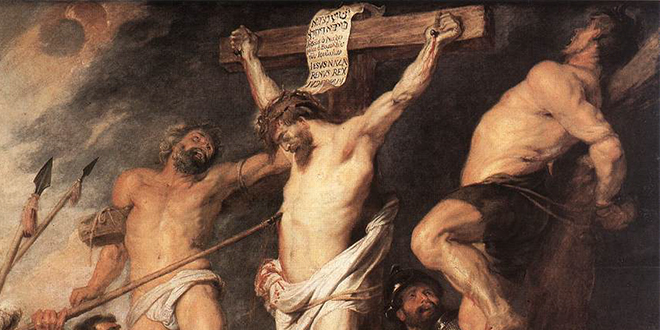Jijo Kandamkulathy, CMF
Claretian Publications, Macau
THE SOLEMNITY OF OUR LORD JESUS CHRIST, KING OF THE UNIVERSE – IN YEAR C
Lk 23:35-43
The Israelites were expecting a great, rich, strong and eternal king who would defeat all the enemies of Israel. In the Gospel passage today, God’s response to these expectations is presented. We are on Calvary. Jesus is crucified with two bandits at his side, and above Him is an inscription: this is the king of the Jews. No throne, but a cross; no servants, but insults; no royal garments, but nakedness. What a strange kingship Jesus has! It is the opposite of what people are accustomed to imagine about kings. Unfortunately, many Christians harbor hopes like the Jews. They identified the kingdom of Christ with victories and triumphs. A defeated king on the cross destroys all our worldly aspirations.
One of the two thieves had little understanding of what the messiah stood for. The only thing he expected from the messiah is freedom from the torture he was subjected to. This thief did not receive what he desired because it was a different kind of freedom that Jesus was to bring, the freedom of spiritual redemption.
The second thief is the only one who recognizes in Jesus the expected king: “Jesus, remember me when you enter into your kingdom.” He calls Jesus by name. He considers Him a friend, the friend of someone who has had his life devastated. He does not consider Him a “gentleman”, but a traveling companion, someone who agreed to undergo, despite being right, the fate of the wicked. He does not expect a miraculous deliverance from Jesus. He asks only to accomplish with Him the last steps of his life that has been a succession of mistakes and crimes. Jesus promises him: “Today you will be with me in paradise.”
That was a judgement of the king as in the judgement scene of Mathew 25. He divides them into sheep and goats. The ones on the left could not recognize when God passed their way. The ones on the right recognized when the Lord passed their way and treated Him well. To the one on the right of His cross, He promises a place in His Kingdom. The history of these criminals is that of every person. Who has not sinned? Who has not disparaged sometimes the life of a brother with hatred, slander, and injustice? Who has not provoked small or big disasters in society, in families, in the Christian community? It is important to trust in the mercy of this King!
At heart, many continue to think that on the cross the kingship of Jesus is not well celebrated. That was just only an unfortunate moment. The real manifestation will take place at the end of the world. Then the glory of Christ will shine: He will come with His army of angels and will show to all, especially to those who crucified Him, His power.
Before He died, Jesus gave a judgment of acquittal to his executioners. Will it also be valid at the end or is it a provisional statement, susceptible to revision? Are there some who believe that when Jesus was on Calvary, He was not in the ideal condition to objectively assess the responsibilities of those who were crucifying Him, still less to manifest all His glory.
Well, if we still cultivate such thoughts, we have not captured the face of God that Jesus has revealed to us. The trial against those who killed Jesus — let it be clear — will not be reopened. He absolved His executioners, saved them in the most glorious moment of His life when, on the cross, He showed the maximum extent of His love. For us, a king triumphs, defeats, humiliates. We try in every way to conform Christ to this image of the kings of this world. We do not want to believe that He wins in the moment in which He loses, in the moment He gives His life. This ruler, who reigns from a cross, disturbs us because He requires that we offer unconditional forgiveness to all those who do us harm.
With this perspective, the final judgment, too, should not be feared, but expected with joy. Stripped of miseries, meanness and pettiness with which we have burdened our minds and hearts, cured of spiritual blindness that has prevented us from understanding the Scriptures, we will learn to forgive everyone unconditionally and be able to see Him as He truly is.
(Indebted to Fr. Fernando Armellini SCJ for the textual analysis)


 Follow
Follow


